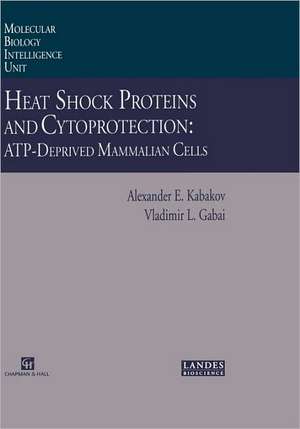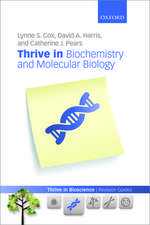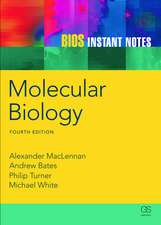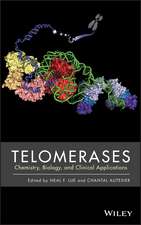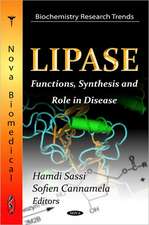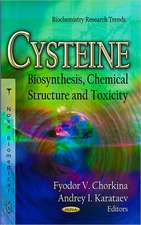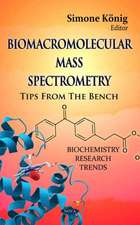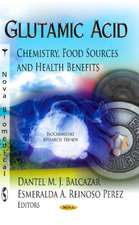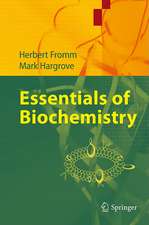Heat Shock Proteins and Cytoprotection: Atp-Deprived Mammalian Cells: Molecular Biology Intelligence Unit
Autor Alexander E. Kabakov, Vladimir L. Gabaien Limba Engleză Hardback – 15 mar 1997
| Toate formatele și edițiile | Preț | Express |
|---|---|---|
| Paperback (1) | 641.53 lei 6-8 săpt. | |
| Springer Us – 24 oct 2012 | 641.53 lei 6-8 săpt. | |
| Hardback (1) | 649.22 lei 6-8 săpt. | |
| Springer Us – 15 mar 1997 | 649.22 lei 6-8 săpt. |
Din seria Molecular Biology Intelligence Unit
- 5%
 Preț: 663.61 lei
Preț: 663.61 lei - 18%
 Preț: 1229.10 lei
Preț: 1229.10 lei - 5%
 Preț: 1091.14 lei
Preț: 1091.14 lei - 24%
 Preț: 776.00 lei
Preț: 776.00 lei - 18%
 Preț: 1226.60 lei
Preț: 1226.60 lei - 15%
 Preț: 642.51 lei
Preț: 642.51 lei - 5%
 Preț: 1098.48 lei
Preț: 1098.48 lei - 15%
 Preț: 638.11 lei
Preț: 638.11 lei - 18%
 Preț: 944.99 lei
Preț: 944.99 lei - 5%
 Preț: 716.09 lei
Preț: 716.09 lei - 20%
 Preț: 552.99 lei
Preț: 552.99 lei - 5%
 Preț: 1096.62 lei
Preț: 1096.62 lei - 5%
 Preț: 1097.71 lei
Preț: 1097.71 lei - 18%
 Preț: 942.94 lei
Preț: 942.94 lei - 18%
 Preț: 1222.49 lei
Preț: 1222.49 lei - 5%
 Preț: 1408.97 lei
Preț: 1408.97 lei - 18%
 Preț: 947.04 lei
Preț: 947.04 lei - 5%
 Preț: 1094.60 lei
Preț: 1094.60 lei - 18%
 Preț: 945.79 lei
Preț: 945.79 lei - 24%
 Preț: 1053.41 lei
Preț: 1053.41 lei - 24%
 Preț: 786.20 lei
Preț: 786.20 lei - 24%
 Preț: 789.90 lei
Preț: 789.90 lei - 18%
 Preț: 945.62 lei
Preț: 945.62 lei - 5%
 Preț: 1095.90 lei
Preț: 1095.90 lei - 5%
 Preț: 1429.27 lei
Preț: 1429.27 lei - 24%
 Preț: 817.72 lei
Preț: 817.72 lei - 5%
 Preț: 1104.84 lei
Preț: 1104.84 lei - 18%
 Preț: 947.85 lei
Preț: 947.85 lei - 15%
 Preț: 640.88 lei
Preț: 640.88 lei - 18%
 Preț: 951.29 lei
Preț: 951.29 lei - 5%
 Preț: 1095.73 lei
Preț: 1095.73 lei - 18%
 Preț: 950.33 lei
Preț: 950.33 lei - 18%
 Preț: 946.55 lei
Preț: 946.55 lei - 18%
 Preț: 952.89 lei
Preț: 952.89 lei - 5%
 Preț: 714.63 lei
Preț: 714.63 lei - 18%
 Preț: 946.41 lei
Preț: 946.41 lei - 18%
 Preț: 947.85 lei
Preț: 947.85 lei - 18%
 Preț: 956.03 lei
Preț: 956.03 lei - 5%
 Preț: 1293.05 lei
Preț: 1293.05 lei - 5%
 Preț: 1098.63 lei
Preț: 1098.63 lei - 18%
 Preț: 944.19 lei
Preț: 944.19 lei - 18%
 Preț: 950.52 lei
Preț: 950.52 lei - 24%
 Preț: 782.72 lei
Preț: 782.72 lei - 18%
 Preț: 953.65 lei
Preț: 953.65 lei - 15%
 Preț: 640.06 lei
Preț: 640.06 lei - 5%
 Preț: 1610.67 lei
Preț: 1610.67 lei - 18%
 Preț: 947.35 lei
Preț: 947.35 lei - 18%
 Preț: 1231.32 lei
Preț: 1231.32 lei - 15%
 Preț: 649.06 lei
Preț: 649.06 lei - 18%
 Preț: 1231.16 lei
Preț: 1231.16 lei
Preț: 649.22 lei
Preț vechi: 763.78 lei
-15% Nou
Puncte Express: 974
Preț estimativ în valută:
124.27€ • 135.03$ • 104.45£
124.27€ • 135.03$ • 104.45£
Carte tipărită la comandă
Livrare economică 21 aprilie-05 mai
Preluare comenzi: 021 569.72.76
Specificații
ISBN-13: 9780412132315
ISBN-10: 0412132311
Pagini: 237
Ilustrații: XVI, 237 p.
Dimensiuni: 178 x 254 x 16 mm
Greutate: 0.66 kg
Ediția:1997
Editura: Springer Us
Colecția Springer
Seria Molecular Biology Intelligence Unit
Locul publicării:New York, NY, United States
ISBN-10: 0412132311
Pagini: 237
Ilustrații: XVI, 237 p.
Dimensiuni: 178 x 254 x 16 mm
Greutate: 0.66 kg
Ediția:1997
Editura: Springer Us
Colecția Springer
Seria Molecular Biology Intelligence Unit
Locul publicării:New York, NY, United States
Public țintă
ResearchCuprins
1. Heat Shock Proteins and the Regulation of Heat Shock Gene Expression in Eukaryotes.- 1.1. The Family of Stress Proteins and Molecular Chaperones.- 1.2. The Regulation of Heat Shock Gene Expression in Eukaryotes.- Concluding Remarks.- 2. ATP Homeostasis, Ionic Balance and Cell Viability.- 2.1. ATP Homeostasis in Mammalian Cells.- 2.2. Cell Viability and ATP Depletion.- 2.3. Significance of Ionic Imbalance for the Death of ATP-Depleted Cells.- 2.4. Mitochondrial Dysfunction and Damage During Ischemia.- Concluding Remarks.- 3. “Proteotoxicity” of ATP Depletion: Disruption of the Cytoskeleton, Protein Aggregation and Involvement of Molecular Chaperones.- 3.1. The Cytoskeleton Under ATP Deprivation.- 3.2. Protein Aggregation in Energy-Deprived Cells.- 3.3. How Do Heat Shock Proteins Respond to ATP Depletion?.- Concluding Remarks.- 4. ATP Depletion as Inducer of Heat Shock Protein Expression.- 4.1. Anoxia and Mitochondrial Inhibitors Activate HSP Gene Expression.- 4.2. Ischemia-Induced HSP Synthesis in the Heart.- 4.3. Stress Protein Expression in Post-Ischemic Brain.- 4.4. Ischemia-Induced Stress Protein Synthesis in Other Normal Tissues and Tumor Cells.- 4.5. Possible Mechanisms of HSP Accumulation After ATP Depletion.- Concluding Remarks.- 5. Heat Shock Proteins and Cardioresistance to Ischemia.- 5.1. Heat Shock-Induced Cardioresistance to Ischemia/Reperfusion Injury.- 5.2. The Role of Myocardial HSPs in Ischemie Preconditioning.- 5.3. The Cardioresistance Induced by Other Stimuli Can Also Be Associated with HSPs.- 5.4. Evidence for the Involvement of HSP70 in Cardioprotection.- 5.5. Are Other Stress Proteins Cardioprotective?.- Concluding Remarks.- 6. Involvement of Heat Shock Proteins in Protection of Various Normal and Tumor Cells from Ischemic Insult.- 6.1. HSPsand Ischemic Tolerance in the Brain.- 6.2. Ischemic Tolerance in the Kidney.- 6.3. HSPs and Protection from Ischemia of Other Organs and Tissues.- 6.4..- Concluding Remarks.- 7. What Are the Mechanisms of Heat Shock Protein-Mediated Cytoprotection Under ATP Deprivation?.- 7.1. Two Paradigms of Cell Tolerance to ATP Deprivation: Reduced Injury During the Stress and the Improved Post-Stress Recovery.- 7.2. Chaperoning Under ATP Depletion as a Special Function of HSP70.- 7.3. How Other Stress Proteins Might Maintain the Viability of ATP-Deprived Cells.- 7.4. How Do HSPs Protect Cells against Necrosis during ATP Depletion?.- 8. Mechanisms of Heat Shock Protein-Mediated Protection from Ischemia-Induced Apoptosis.- 8.1. HSPs and Triggering of Apoptosis in Ischemic Cells.- 8.2. HSPs and Transduction of the Apoptotic Signal.- 8.3. HSPs and the Execution of Apoptosis.- 9. Conclusions and Perspectives.- 9.1. Adaptation to Energy Starvation on The Molecular Level.- 9.2. Heat Shock Proteins and Ischemia: Significance for Medicine.- Concluding Remarks.
